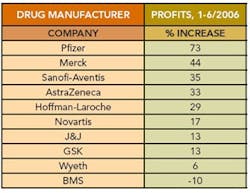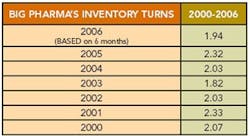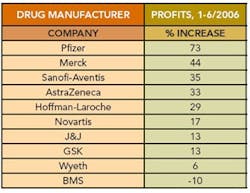From the Editor: The Value of Lean, or Lean Values
|
"A cynic knows the price of everything but the value of nothing." Oscar Wilde |
September marked that annual media blitz, when leading drug makers release their mid-year financial figures. Despite concerns about the impact of Medicare Part D and branded drug patent expirations, the top 10 drug manufacturers may have actually seen their profit margins increase this year. Between January and June, profits rose by a healthy $8 billion, according to industry critic Representative Henry Waxman, who published data that he claims are based on financial analysts' most recent reports (Table, at right, bottom).
Given all the Lean Manufacturing programs that Big Pharma has rolled out over the past few years, I wondered whether Lean had played any part in achieving these miraculous margins, and did a quick calculation of top companies' efficiencies based on mid-year and historical annual report data (Table, at right, top).
Because, if pharma's "Lean" index isn't budging, its "Mean" index appears to be trending upward. I didn't try to graph increases in drug prices (Waxman says that some of these have risen sharply), or correlate efficiency to the number of jobs that have been eliminated since 2004.
Of course shareholders are important, but I wonder how many large drug companies are truly connected with two other critical groups those who make their products, and those who buy them. Today, for example, consumers cry out for lower drug costs. Yet, this demand is not even driving a "KPI" at many companies. Our survey on operational excellence (Pharmaceutical Manufacturing, June, p. 16) found everyone riveted on "improving efficiency," but few considered reducing drug prices to be important.
Price cuts are possible as Merck and Pfizer showed us last June, when they reduced some prices to sub-generic levels to thwart competitors. Wouldn't it be better to make these cuts voluntarily, and ensure that Lean becomes part of the corporate fabric? Retailer Wal-Mart just reduced prices for generic drugs in Florida by 70%, a move that may help improve its public image.
One anonymous reader advises: Stop working for Wall Street. Put more effort into employee satisfaction and customer loyalty. What you give is what you get. Heres hoping that you find a closer connection to those whose lives, and livelihoods, depend on you and your products, and that your Lean projects deliver value to both.


